#al-qurtubi
Text
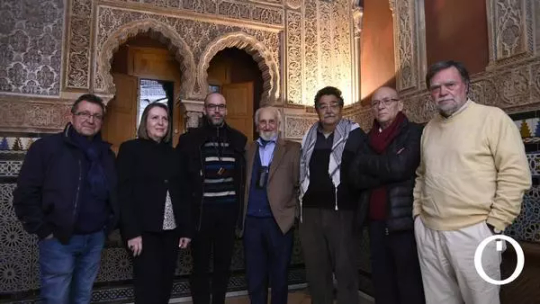
Proposed twinning of Heraklion and Córdoba.
The Cordoban rebels of the 9th century who were expelled by the emir and founded a kingdom in Crete
• A group of citizens promotes the twinning* of Córdoba and Heraklion, in an act in which direct descendants of the Rabadis take part, the Andalusians who arrived at the edge of the Mediterranean 1,200 years ago to stand up to another empire, the Byzantine Empire.
Córdoba and Heraklion (the capital of Crete) have an unknown history in common, that of the Rabadks: a rebellious people, who one day stood up to the emir of Al Andalus for the high taxes they paid and who ended up expelled and founding a kingdom which lasted a century and a half in the confines of the Mediterranean. Now, a group of citizens from Cordoba and Crete have come together to claim this history, this common past, and promote twinning between two cities that share the past of a group of citizens who did not give up. Its history has remained hidden after Crete was conquered by the Byzantine Empire and controlled by the Orthodox Church ever since.
This Tuesday, the Living Library of Al Andalus (in the historic Plaza del Bailío in Córdoba) hosted a round table attended by descendants of those Cordobans who 1,200 years ago were forced to go into exile, who disembarked after many vicissitudes. on the island of Crete and who ended up founding a kingdom that also stood up to another empire, in this case the Byzantine one, for more than a century.
Their story was told in Spain by two writers. One was Manuel Harazem from Córdoba, now deceased, in 2017. His book was titled La Odisea de los Rabadíes (The Odyssey of the Rabadis), with the subtitle of what he considered to be The First Hispanic Exile. Harazem had spent years of his life studying the rabadís, the inhabitants of a suburb of Córdoba where new homes were never built again. The writer Carmen Panadero has dedicated a trilogy to the vicissitudes of the Rabadis, a story that began in the year 818, when their revolt began in what is now the Miraflores park in Córdoba. Several meters from the surface where tourists walk, in the great meander that the Guadalquivir draws a few meters from the Mosque of Córdoba, the foundations of the houses of the Rabadis are still preserved, which were razed by order of the emir of Qurtuba. Until not long ago, those foundations were visible. A building by Rem Koolhas, the South Palace, was to be built above it. But they have just been buried by tons of earth so that tourists can park.
In the 9th century, the residents of this immense Cordoban suburb rebelled over taxes. The emir Al Hakem I wanted to set an example and executed a good part of them, either by sword or by crucifixion. Those who survived were sent into exile. Some to the current Morocco, where they came to co-found Fez (that is why Córdoba is already twinned with this city, which has a neighborhood called the Andalusians), and others to Toledo (that is already twinned with Heraklion, because they're linked by Doménikos Theotokópoulos "El Greco", since he was born in Heraklion and he later settled and died in Toledo), from where they also had to be exiled again. From there they ended up in Greece and Alexandria, where they faced the Byzantines. But the Caliphate of Baghdad surrounded them again, they were expelled from Alexandria and had to go to sea again, until they landed in Crete. And no one moved them from there in 140 years. They entrenched themselves and founded a kingdom.
THE EMIR OF THE ACORNS
In 2017, Harazem recalled that when the Rabadis settled in Crete, they founded a city “which they named Arrabal in honor of the Arrabal of Saqunda, consolidating a dynasty of emirs, the first of whom, born in Bitrawsh, nowadays known as Pedroche (a town from the province of Córdoba, 93 km away from the city), carried the nickname of al-Balluti (from Fahs al-Ballut**, the plain of acorns, the Arabic name of the current valley of Los Pedroches), and the last the nickname of al-Qurtubi, that is, the Cordoban. But al-Qurtubi had already been born in Crete. Although he chose to keep the Cordoban nickname, so as not to forget the origin of an eventful dynasty.
The books by Carmen Panadero and Harazem had an impact on the society of today's Córdoba. So much so that some citizens, such as Panadero herself, Miguel Santiago or José Esquinas (former president of the FAO and resident in Córdoba) rushed to commemorate a sad anniversary in the first few days: the 1,200 years since this group of Cordobans rebelled against the taxes of Al Hakem I and were pushed to death or exile.
In Carmen Panadero's third book, Los andaluces fundadores del emirato de Creta (The Andalusian Founders of the Emirate of Crete), the protagonist is the grandfather of Nikolas Metaxas. Nikolas has been in Córdoba all week. On Monday he was in Pedroche, leaving a floral offering at the bust of al-Ballutí. And this Tuesday he was the protagonist of the conference at the Al Andalus Library, where he told his story, that of his grandfather and also that of his ancestors. Nikolas's grandfather undertook a trip to Córdoba in the seventies of the 20th century in search of his origins. He was the first person to question his origins, which are taboo in Crete. He traveled through Córdoba, visited the Saqunda neighborhood, devastated since 818. And he also crossed the Strait, like his ancestors, to Fez, to the Andalusian neighborhood, to see the city that his ancestors co-founded.
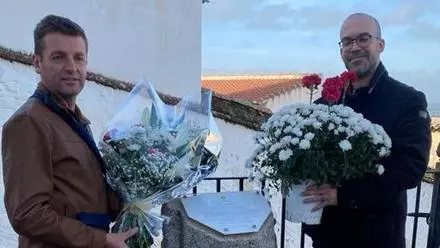
Two of the heirs of the Cordobans in Crete, before the bust of the first emir, which stands in Pedroche.
A SILENCED HISTORY
The heir to that legacy is today Nikolas, who has arrived in Córdoba with the intention of little by little dispelling that taboo. In Crete, those of Andalusian origin are called Creto Arabs. And they are not well considered. The weight of the Orthodox Church and the Islamic past of their ancestors conditions them. And the history drawn by the victors points them out as rebels without a cause who entered Crete “with fire and blood.”
Crete today has less than 180,000 inhabitants. It is estimated that in the Saqunda riot, in Qurtuba, some 20,000 Cordobans were expelled. At least half reached Crete, where they lived in peace for 140 years. Until Byzantium conquered the island and they were forced to change their religion.
To this day, much is unknown about his legacy. But a group of descendants has already managed to tell the story of the Andalusians in the Heraklion museum. At the University of Athens, papers have begun to be published that contradict the official history, that the Andalusians were nothing short of barbarians. And they point out the opposite: that they were artisans, who dominated finance and agriculture, and that as soon as they arrived they began to trade and issue their own currency, revolutionizing the economy of the largest of the Greek islands.
Now, the objective of the heirs of the also called Rabadis is to ensure that their history is known and that Córdoba can be twinned with Heraklion to claim a common past. As with the history of Islamic Córdoba, these Andalusians maintain that their ancestors behaved in Crete as in Al Andalus, tolerated all religions, promoted trade, agriculture and knowledge. “And that is something we need in these times,” concludes Miguel Santiago, one of the Cordoban inhabitants of the Córdoba of the 21st century.
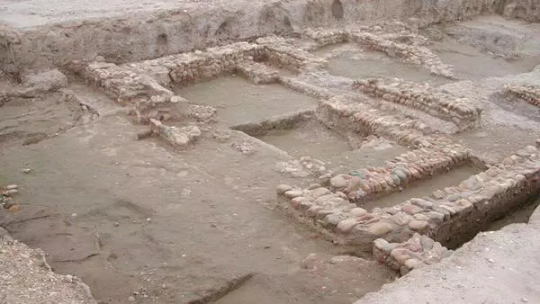
Excavation of the Saqunda suburb
Here's another article if you want to know more about the topic
*Twin cities or sister cities I don't know what term is used more. For example, this are the sister cities of Córdoba, Heraklion, Fez, Toledo and Alexandria:
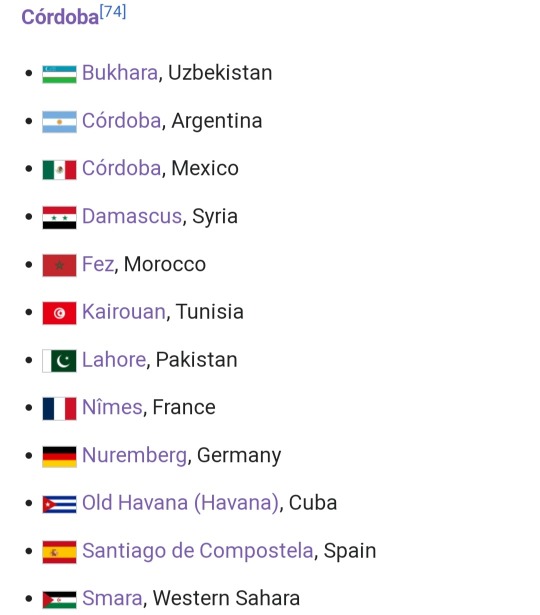

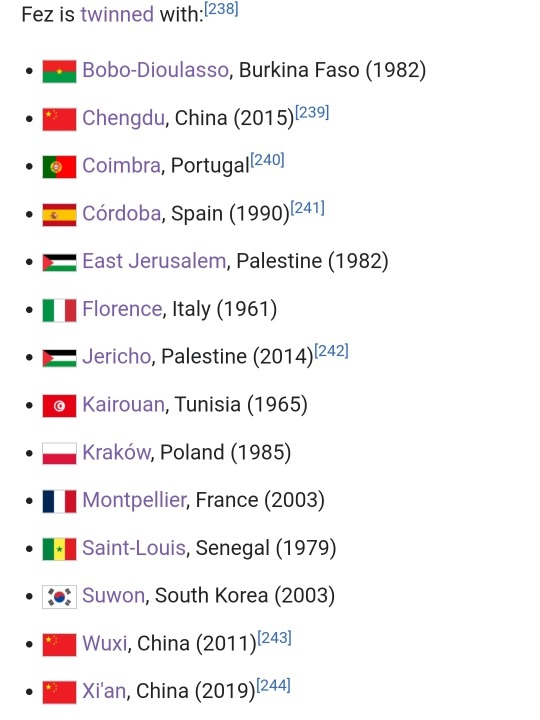
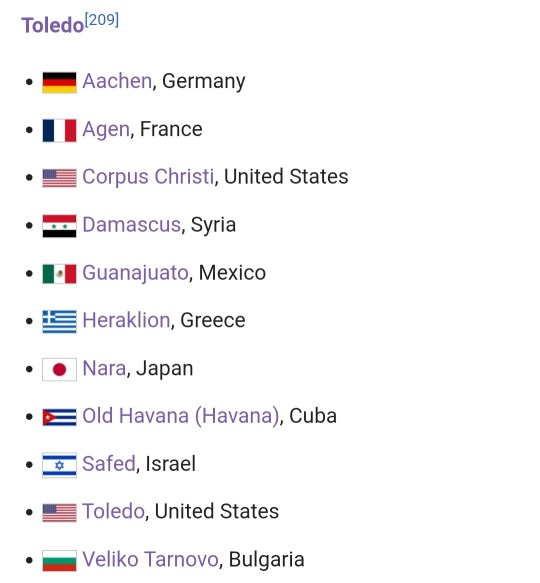

** The word for acorn in Spanish, bellota, comes from the Hispanic Arabic بلّوطة (balloṭa), singular of بلّوط (balloṭ), variant of classical Arabic بَلُّوط (ballūṭ)
#al andalus#emirate of cordoba#córdoba#qurtuba#heraklion#emirate of crete#history#middle ages#rabadíes#al-balluti#al-qurtubi#rabadi dinasty#dinastía rabadí#al hakem i#al hakem i of cordoba#emirato de córdoba#emirato de creta
0 notes
Text
#Al-Jami li Ahkam al-Quran#Imam Abu Abdullah Al-Qurtubi (رحمه الله)#Quran Urdu Tafsir Chapterwise PDF#الجامع لأحكام القرآن
1 note
·
View note
Text
Para Pemakan Bangkai
republika
Allah Ta’ala berfirman dalam surat al-Hujarat ayat 12 :
يَٰٓأَيُّهَا ٱلَّذِينَ ءَامَنُوا۟ ٱجْتَنِبُوا۟ كَثِيرًا مِّنَ ٱلظَّنِّ إِنَّ بَعْضَ ٱلظَّنِّ إِثْمٌ ۖ وَلَا تَجَسَّسُوا۟ وَلَا يَغْتَب بَّعْضُكُم بَعْضًا ۚ أَيُحِبُّ أَحَدُكُمْ أَن يَأْكُلَ لَحْمَ أَخِيهِ مَيْتًا فَكَرِهْتُمُوهُ ۚ وَٱتَّقُوا۟ ٱللَّهَ ۚ إِنَّ ٱللَّهَ تَوَّابٌ رَّحِيمٌ
“Wahai orang-orang yang beriman, jauhilah banyak…

View On WordPress
#Al Hujarat 12#bergunjing#Buya Hamka#cacat#Facebook#Ghibah#Instagram#kebobrokan#media sosial#memakan daging saudaranya#mencari-cari kesalahan#mengorek-ngorel#Mengoyak kehormatan#menjijikkan#Pemakan Bangkai#prasangka#Tafsir Al Azhar#Tafsir Al-Qurtubi#Telegram#Twitter#whatsapp#Youtube
1 note
·
View note
Text
Tafsir al qurtubi english pdf

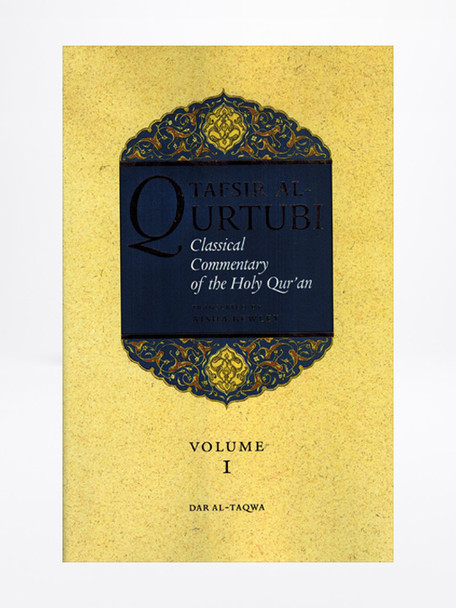
This fascinating and important book attempts to investigate the nature of the seven Ahruf in which the Qur’an has been revealed and the reason for the variations in readings among the Qurra’ of the Quran. Publisher: International Institute of Islamic Thought (IIIT) Explanation (abridged Tafsir) by Ibn Kathir (translated by Safi-ur-Rahman al-Mubarakpuri) We hope that by doing this an ordinary English-speaker will be able to pick up a copy of this book and study and comprehend The Glorious Qur'an in a way that is acceptable to the understanding of the Rightly-guided Muslim Ummah (Community). Background introductions by two famous Islamic scholars, Maududi and Ibn Kathir 5. The meaning of the qur'an (translated by Dr. This will give them a sample of the sound of the Qur'an, which they could not otherwise comprehend from reading the English meaning. Transliteration of the Arabic text for those who are unable to read the Arabic script. The Arabic Text for those who are able to read Arabic 2. This book tries to do this by providing the following: 1. Our mission is to gather in one place, for the English-speaking public, all relevant information needed to make the Qur'an more understandable and easier to study. The reader is now able to read not only the meaning, the transliteration and the tafsir (explanation) of the Glorious Qur'an but also the full Arabic text as well. We have also re-arranged the structure of the book and added the full Arabic Text of the thirty Parts of the Qur'an. In this new edition, we have corrected all the errors found in the first edition. The first edition of this book contained many formatting and typing errors. This is the 2nd edition of volume 5 of the ten volumes of The Meaning And Explanation Of The Glorious Qur'an. As such, it will be of great interest not only to researchers and students of Sufism but also to scholars of comparative spirituality and mysticism. Reconstructing his life in chronological order and providing the most comprehensive appraisal of his works to date, it explores a facet of al-Muhāsibī’s teaching which as yet has not been studied, namely his understanding, concept and methodology regarding the purification of the soul within the Islamic paradigm. Assessing the extent to which the political, social and economic factors played a part in his life and work, Gavin Picken provides a comprehensive overview of his work and its great significance in the development of Islamic spirituality. Although al-Muhāsibī was well known for his skills in many disciplines, including the Qur’ān, Prophetic narration and scholastic theology, it is his mastery in the field of Islamic spirituality and moral psychology for which he is best remembered. This book examines the work of a scholar of this discipline, al-Hārith al-Muhāsibī, who lived and worked during the classical Islamic period under the Abbāsids. Purification of the soul is a principle that is central to understanding Islamic spirituality but despite this, relatively little has been written explicitly in the Islamic tradition regarding this discrete method of spiritual purification.

0 notes
Text
'Umar b. Al-Khaṭṭāb رضي الله عنه said:
“If you see that someone has slipped, correct him, pray for him & don't help Shaytaan against him (by insulting him).”
[Tafseer al-Qurtubi, v. 15, p. 256]
926 notes
·
View notes
Text
Imam al-Qurtubi رحمه الله said:
“A person should be gentle when he speaks to people and maintain a cheerful face with both the pious and the impious.”
[Tafsir al-Qurtubi | 2:38]
#muslim#sayings of the salaf#sunnah#islam#quranandsunnah#religion#salaf#islamic reminders#islamicquotes#islamicreminders
160 notes
·
View notes
Text
Shyness lies in the eyes. The girl who stares at men and distributes her glances to the passerby will lose something of her beauty. Thus Allah described the Hoor al-Ayn (maidens of paradise) as:
'and with them will be women of limited glances, with large, (beautiful) eyes.’ 37:48
[al-Qurtubi ( رحمه الله), at-Tadhkirah, pg. 31, Ibraheem al-Sakran ( رحمه الله)]
#islam#quote#allah#hijab#knowledge#inspirational quotes#islamicadvice#islam4 life#jilbab#la ilaha illa allah#islamicreminders#islamicart#islamicquotes#islamic#muslim revert#muslim reminder#muslimah#muslim#hadith
100 notes
·
View notes
Text
Al-Qurtubī رحمه الله said:
“A person should be gentle
when he speaks to people
and maintain a cheerful face with both the pious and the impious.”
[Tafsir al-Qurtubi, 2:83]
101 notes
·
View notes
Text
“Don’t preach if you don’t practice”
“Practice what you preach”
Hasan al-Basri said to Mutarraf Ibn Abdullah:
"Advise your companions!"
He replied: "I am scared to say something to them that I do not practise myself."
Hasan said: "May Allah have mercy upon you! Who is there amongst us who does everything he says?
This is how Shaytan attains his objective, so that no one enjoins goodness and forbids evil."
(Tafsir al-Qurtubi, 1/367)
48 notes
·
View notes
Text
Kita dianjurkan untuk bersahabat dengan penjual minyak wangi.
Siapa penjual minyak wangi itu?
Ahli Ilmu & orang-orang yang Agamanya baik.
Tapi banyak yang nge klaim berilmu. Gimana cara bedainnya?
Kriteria mereka:
1. yang kalau dia bicara, membuat Ilmu kita nambah.
2. yang kalau dia bersikap, membuat kita semakin baik dalam ber-Adab.
3. bersama mereka/dengan sudut pandang mereka membuat kita lebih takut kepada Allah.
(Imam Al-Qurtubi menyampaikan)
25 notes
·
View notes
Text
The Rabadis: The story of some expelled Cordobans who ended up founding a kingdom
History has buried the Rabadíes in the “common grave” of memory, some people from Córdoba who one day rose up against the power of the Umayyad emirate of Córdoba and who, expelled, ended up founding a kingdom in the heart of the Mediterranean that lasted more than a century. Manuel Harazem has rescued the “odyssey” of these Cordobans who one day in the year 818 said enough to the Umayyad power, which razed their neighborhood, Saqunda, to the ground. His remains are still visible, hopefully, in the depths of the site where Rem Koolhas' South Palace was to be built in Miraflores. Next year marks 1,200 years since the beginning of an unknown yet fascinating odyssey: how some expelled Cordobans ended up conquering Crete, appointing an emir who bore the name of Córdoba and even giving its name to a city.
This Friday, Manuel Harazem presented a book that can be purchased in Córdoba bookstores and also on Amazon, and which he titled The Odyssey of the Rabadis, subtitling it as the first Hispanic exile. The story begins in Córdoba and ends in Constantinople, present-day Istanbul, where the Byzantine Empire imprisoned the emir of the kingdom of the Rabadis, the Andalusian Cordobans who had dared to challenge its rule with an independent kingdom in the middle of the Mediterranean. But the book is much more.
"By 818 the situation for Córdoba was that of being the capital of the kingdom, enjoying considerable prosperity that had allowed the creation of a huge suburb outside the walls and the existence of an autocratic government that handled tax levy with an iron fist. Crushed by taxes, the 30,000 inhabitants of the suburb took up arms against the emir. I say 30,000 to say, because there were probably many more,” Harazem detailed during the presentation of the book.
"The rim of a dirham was needed for the revolt to be successful. But it was not like that. Once surrounded, a brutal repression was unleashed that had several consequences: the death by sword or crucifixion of a good part of the inhabitants and the sending of the rest into exile. The suburb was razed to the ground and the emir placed a curse on it that nothing would ever be built there again. Damn, as we saw with the South Palace, it is still perfectly valid,” the writer explained, also with notes of humor. The remains of that neighborhood have been visible until recently, when they have been buried again by tons of earth.
After the massacre of 818, some Cordobans left for Fez, welcomed by the emir Idriss II. Others marched to Toledo, from where they were expelled again. From there they went on a long exile to Greece, settled in Alexandria and stood up to Byzantium, founding an independent state. “According to canonical history,” warns Harazem, who wanted to investigate and deepen, and above all put an end to the cursed history of these exiled Cordobans, for whom the official history is nothing more than pirates who dedicated themselves to plundering the coasts. Ten years later, they are again expelled from Alexandria by forces from Baghdad. From there they finally arrived at the island of Crete, “founding a capital which they named Rabdh or Arrabal* in honor of the Rabdh or Arrabal of Saqunda, founding a dynasty of emirs, the first of whom, born in Pedroche, therefore bore the nickname of al-Balluti (from Fahs al-Ballut, the Plain of the Acorns, the Arabic name of the current valley of Los Pedroches), and the last the nickname of al-Qurtubi, be it The Cordoban” recalls the writer.
I have tried to stick strictly to the sources and texts of contemporary authors that were related to those events. And if I have any merit, it is probably that I have completely sequenced the story in a single book,” says Harazem, author of other self-published books. "On the other hand, I have contributed small studies and especially I have launched a theory about the name of the city they founded there, Rabdh al-Khandaq**, making it fall back to the feeling of longing, of ghurba, since I strongly suspect that that first part of it Rabdh refers to Rabdh Shaqunda, the suburb from which they came and from which they were violently expelled. No other city in the Arab world was founded with the name of one of its parts.No city was named Arrabal***,” he details.
But Harazem goes further. The subtitle of the first Hispanic exile advances the comparison it makes with that suffered 1,100 years later by other Spaniards, the Republicans, who were not given the opportunity to go into exile, but rather had to escape to do so. Also, like the Rabadíes from Córdoba, they left their mark wherever they settled. And his memory also ended up buried in a common grave.
But the Saqunda rebellion is, for Harazem, the first revolt of the class struggle documented in the Iberian Peninsula. It does not say that there were others before, but it does say that this one is perfectly documented by some remains that are no longer seen on which a parking lot is going to be built to know, precisely, the historical past of Córdoba.
More about this topic
* The Spanish word arrabal (suburb/outskirts) comes from the Andalusian Arabic الرَبَض (arrabáḍ), and this from classical Arabic رَبَض (rabaḍ, "outskirts"). The word raval and arrabalde, in Catalan and Galician respectively, have the same root and meaning.
** Rabḍ al-ḫandaq (ربض الخندق, often given the meaning of "Castle of the Moat", so rabḍh may not come from rabaḍ, but from classical Arabic ribāṭ, a kind of fortification, that is the origin of toponyms like capital of Morocco Rabat, and some in the Iberian Countries, most of them derived from rābiṭa, La Ràpita, sa Rápita, La Rábida, La Rábita, Calatrava, Arrábida) was hellenized as Χάνδαξ (Chándax) or Χάνδακας (Chándakas) and Latinized as Candia, one of the names given to Crete.
*** Fun fact: there's no city called Arrabal, but in Castilla y León, concretely in the province of Zamora, there's a small town called Arrabalde. The province of Zamora is close to Galicia and in some parts of Zamora Galician is still spoken, mainly in region of Sanabria.
#al andalus#córdoba#emirate of cordoba#emirate of crete#emirato de córdoba#emirato de creta#dinastia rabadí#rabadi dinasty#heraklion#middle ages#al balluti#al qurtubi#rabdh al-khandaq#candia#crete#creta#history#andalusian history#la odisea de los rabadies
1 note
·
View note
Text
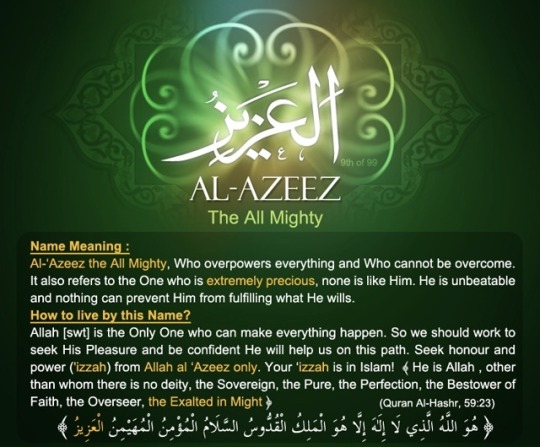
Allah calls Himself Al-‘Azeez— The Almighty, The Strong– on 92 occassions in the Quran. He is the One who overcomes everything. Al-‘Azeez is the incomparable source of all strength and might, and His power cannot be overcome or resisted. He gives honour, dignity, and strength to whomever He wills!
The Powerful, Noble, Invincible, and Incomparable
‘Azeez comes from the root ‘ayn-zay-zay, which points to four main meanings. The first main meaning is to be mighty and powerful and the second is to be noble and elevated. The third main meaning is to be invincible, and the fourth is to be rare and unattainable.
This root appears 119 times in the Quran in 7 derived forms. Examples of these forms are waʿazzanee (“and he overpowered me”), a’azzu (“mightier”), and ‘izzan (“an honor”).
Linguistically, al-‘izz originally means strength (quwwah), severity (shiddah), and conquest (ghalabah). ‘Azeez points to three concepts: ya’izzu, which means nobility, ya’uzzu, which means to prevail and be dominant, and ya’azzu, which means being mighty and powerful. Al-‘Azeez is the Noble One, no one is like Him, He is ghaalib and has overcome everything in that He has subdued it [Ibn Katheer] and He is the Invincible who cannot be reached and overcome. [Al-Qurtubi]
Al-‘Azeez Himself says: And know that Allah is All-Mighty, All-Wise [Quran, 2:260] And . . . Allah is All-Mighty, All-Able of Retribution [Quran, 3:4] . . . And verily, your Lord! He is truly the All-Mighty, the Most Merciful. [Quran, 26:68]
A beautiful poem about Al-‘Azeez
Ibn ul Qayyim raheemahullah wrote in his Nooniyyah: And He is al-Azeez whose (status) cannot be reached (overcome) How can He be reached, the owner of all Power? And He is al-‘Azeez, the Overpowering (al-Qaahir), the Subduing Overcomer. Nothing overcomes Him, so these are two characteristics. And He is al-Azeez, with Strength (quwwah) and this is His description. Al-Izz, therefore, has three meanings. And these are the ones that are perfected for Him, free is He of all imperfection, From every single aspect, the One who is devoid of any deficiency.
A powerful and wise combination
How many people have power but misuse it? The combination Al-‘Azeez-ul-Hakeem (The All-Mighty, the All-Wise) appears 47 times in the Quran; Allah al-‘Azeez uses His power with perfect wisdom. Allah ‘azza wa jall uses Al-Azeez-ur-Raheem (The All-Mighty, The Merciful) which occurs twelve times in surah Ash-Shu’araa after the narration of each destroyed nation. Against the disbelievers He is mighty and especially merciful to the believers striving on His path.
How can you live by this name?
1. Seek your strength from Al-‘Azeez.
Having faith in Al-‘Azeez gives you courage because you know Your Lord is unbeatable. Whatever He wills happens, even if the people will otherwise, and whatever He wills not to happen won’t, even if the people will it. So only work to seek His pleasure and be confident He will help you. He has power over all things, so accept whatever happens to you and show sabr (perseverance) and shukr (gratefulness) for whatever befalls on you. When you feel weak or overpowered, turn to Al-‘Azeez for strength.
2. Know that your ‘izzah is in Islam.
Your honor does not lie in money, power, or looks; rather your honor is only in Islam. How many seek honor from other things or people? Al-‘Azeez said: Those who take disbelievers for protectors (or helpers or friends) instead of believers, do they seek honor, power and glory with them? Verily, then to Allah belongs all honour, power and glory. [Quran, 4: 139] Seek your honor in this life and the next from Al-‘Azeez only, by obeying Him and following His Messenger.
3. There’s no hiding from Al-‘Azeez.
Let Al-‘Azeez make you recognize that no matter who you are, how pious or “high-positioned” you are, you can never hide from His might and power. The repetition of Al-‘Azeez in the Quran can teach you that you constantly have to remind yourself that you can never go against His Will, and He is mighty against those who disobey Him.
4. Power doesn’t mean honor!
Always use your own “power” or authority in an honourable way, over your children or spouse for example. Train yourself to have strength to resist desires by reminding yourself of the wisdom Al-‘Azeez, who uses His power with wisdom, and always try to strengthen others with your advice, skills, or company.
The Prophet salallahu ‘alayhi wa sallam said: Whoever a believer is humiliated before him and he does not help him when he is able to do so, Allah will humiliate him before the creation on the day of judgment. [Ahmad]
5. Honor trusts.
The Prophet salallahu ‘alayhi wa sallam said: All of a Muslim is inviolable to another Muslim: his blood, his wealth and his honor [Muslim]. Don’t harm others by your tongue or hand; don’t backbite, slander, or misuse their belongings or even expose their faults.
You can even earn Allah’s protection from the Fire by defending someone’s honor. The Prophet salallahu ‘alayhi wa sallam said: Whoever defends the honor of his brother, then Allah will protect his face from the Hellfire on the Day of Resurrection. [At-Tirmidhee]
An example is to rebut backbiting in a company and to mention something good about the person in his or her absence. Your relationships with others are a trust (amaanah) from Al-‘Azeez and you should honor each trust you are given— in your dealings with others, as well as your own body and emaan— by looking after them according to the guidelines of Al-‘Azeez.
6. Use the Quran, al-’azeez!
Allah ‘azza wa jall called the Quran azeez because it is His speech: Verily, those who disbelieved in the Reminder (the Qur’ân) when it came to them (shall receive the punishment). And verily, it is an honourable respected Book. Falsehood cannot come to it from before it or behind it (it is) sent down by the All-Wise, Worthy of all praise. [Quran, 41:41-42]
Stop and reflect; this means the Quran contains everything you need to succeed in life, because it comes from your Creator. It is your manual— and why is a manual read? Only because you want to make something work. So don’t just read the Quran but also use it as your manual.
O Allah, Al ‘Azeez, we know that all might belongs to You. Adorn us with the honour of Islaam, protect us from misusing our powers, make us of those who rely upon Your power only, make us benefit from the Quran and protect us from all of those who want to overpower us, ameen!
#allah#islam#revert help team#asma al husna#revert help#muslim#ayat#daily#allah’s name#dua#pray#prayer#salah#muslimah#hijab#religion#reminder#mohammed#new revert#new convert#new muslim#how to convert islam#converthelp#convert islam#become a muslim#welcome to islam#daily ayat#prophet#god#revert
12 notes
·
View notes
Text
Imam al Qurtubi رحمه الله said,
Shyness lies in the eyes.
The girl who stares at men and distributes her glances to the passerby, will loose something of her beauty. Thus, Allah described Hoor as, ‘And with them will be women limiting their glances with large, beautiful eyes.’
[At Tadhkirah, Pg. 31]
13 notes
·
View notes
Note
Assalamualaikum, I was wondering if you had any insight on how to stop doing a sin. How do you know your repentance is sincere? I know Allah swt is all merciful and all-forgiving, and I do want to please him, but there are times when I am weak and go back. How do I stop?
Jazakallukhairun for your advice.
Muslim in this world is vulnerable to falling into sin and disobedience. What is required of him – if he does fall into sin – is to hasten to repent and seek forgiveness
Turning to Allah, may He be exalted, in supplication and beseeching Him to avert sins from him. Allah, may He be exalted, says (interpretation of the meaning): “And when My servants ask you, [O Muhammad], concerning Me - indeed I am near. I respond to the invocation of the supplicant when he calls upon Me. So let them respond to Me [by obedience] and believe in Me that they may be [rightly] guided.” [al-Baqarah 2:186]
Striving to control the nafs (self, and its evil inclinations), warding off its intrusive thoughts and trying to purify it by obeying Allah. Allah, may He be exalted, says (interpretation of the meaning): “And [by] the soul and He who proportioned it, and inspired it [with discernment of] its wickedness and its righteousness, he has succeeded who purifies it, and he has failed who instills it [with corruption]” [ash-Shams 91:7-10] and “And those who strive for Us - We will surely guide them to Our ways. And indeed, Allah is with the doers of good.” [al-'Ankabut 29:69]
Reflecting upon the stern warning mentioned in the hadith of Thawban quoted above, and fearing lest it apply to the one who commits those sins when he is alone.
Ibn Hajar mentioned that Qurtubi quoted 23 different definitions of true repentance (al-tawba al-nasuh) in his tafsir. Ibn Hajar mentioned the most important of these:
Umar’s words (Allah be pleased with him) that it is, “To sin and then never to return to it.”
To hate the sin, and the seek forgiveness for it every time it occurs to one, as Hasan al-Basri (Allah have mercy on him) said.
Qatada’s words (Allah have mercy on him), “To be genuine and truthful in one’s repentance,” which is what Imam Bukhari chose as the definition of true repentance in his chapter heading.
To have sincerity in one’s repentance.
To be concerned about one’s repentance not being accepted.
To be such that it does not need another repentance after it.
To be made out of fear and hope, and be accompanied by consistency in worship.
Like the seventh, but with the added condition that one desert those who assisted one in sin.
19 notes
·
View notes
Text
Al-Qurtubi رحمه الله said:
“It is incumbent to persist in supplication, refrain from despairing of being answered, and maintain hope. Consistency in earnestly invoking is key, as Allah indeed loves those who persist in supplication.”
Al-Mufhim | 7/63
#sayings of the salaf#sunnah#islam#religion#muslim#islamic reminders#islamicquotes#quranandsunnah#salaf#islamicreminders#athar#athari
115 notes
·
View notes
Text
“Don’t preach if you don’t practice” “Practice what you preach”
Hasan al-Basri said to Mutarraf Ibn Abdullah:
"Advise your companions!"
He replied: "I am scared to say something to them that I do not practise myself."
Hasan said: "May Allah have mercy upon you! Who is there amongst us who does everything he says?
This is how Shaytan attains his objective, so that no one enjoins goodness and forbids evil."
(Tafsir al-Qurtubi, 1/367)
#islam#quote#allah#hijab#knowledge#inspirational quotes#islam4 life#islamicadvice#jilbab#la ilaha illa allah#islamicreminder#islamicart#islamicquotes#islamic#muslim#muslimah#muslim reminder
44 notes
·
View notes